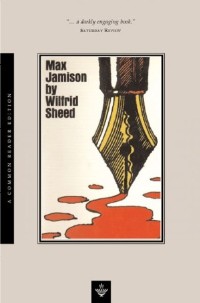Critical Homage: Wilfrid Sheed — Farewell, Bittersweet Critic
Sensing the lonely importance of your review, you may lapse into muddleheaded kindness and a groping for a middle position that doesn’t exist. When this happens, no bribe has changed hands, no paper crown for Mr. Nice; you have sold out simply to your own weakness and the fundamental thinness of your vocation. — Wilfrid Sheed in “The Politics of Reviewing”

The late Wilfrid Sheed — He brilliantly calibrated the personal and professional wages of artistic assessment.
By Bill Marx
The obits for London-born writer Wilfrid Sheed, who passed away at the age of 80 in Great Barrington last Wednesday, emphasize his tartly satiric fiction, which is understandable given that some of these books—Office Politics (1966), Max Jamison (1970), and People Will Always Be Kind (1973)—were finalists for National Book Awards. I would also heartily recommend The Hack (1963), one of the best novels about the writing life, this one featuring a tortured, Catholic sensibility concocting a witches brew of personal tensions and creative panic.
But Sheed was a gifted critic, particularly on books, though he also wrote with eccentric verve about film and theater—it was he who memorably opined that French director Jean-Luc Goddard was saddled with “the literary sensibility of a fifth-rate Armenian novelist.” He also mediated, via non-fiction and fiction, on the nature of the reviewing temperament and how the game is played (and corrupted) in America, bringing a self-deprecating intelligence to examining the log-rolling politics and pint-sized authoritarian personality of the critter critical.
In some ways he anticipated, without panic or cerebral retreat, the cultural diminution of the voice of the arts reviewer. Sheed saw the comic potential in the egomaniac machinations of intellectuals accumulating power by degrading the life of the mind: he often explores how the critics themselves aid and abet their whittling-down-to size. His novel Max Jamison, an acidic look at the daily grind of theater criticism and its (inevitable?) psychological melt-down, stars a New York stage reviewer nearing the dark-end-of-his-tether. The book suggests that in America the language of evaluation, already polluted by advertising hype, has now become infected by show biz glibness:
He had sensed that in educated America, humor was the number 1 language, for criticism, passion, even cooking; and he set about learning it with grim intelligence. Until he was among the best, far ahead of the naturals and the kibitzers. Until it was his actual trademark, dyed into his hide, and he could not write two lines without it.
I would highly recommend Max Jamison, which was reissued by The Akadine Press in 2002. Critic John Leonard sums up this sour farce appropriately: “Does for critics what Ionesco did for rhinoceroses.”
Those who want to read Sheed’s criticism should turn first to his 1971 collection The Morning After, reissued, with additional material including a new introduction, by The Akadine Press in 2002. There are trenchant reviews of books from John Updike, Alberto Moravia, Walker Percy, and Kurt Vonnegut, a
chuckle-ish take-down of the New York Times Book Review in “The Politics of Reviewing,” and some bizarre but amusing looks at film and theater, including a misguided but funny review of Edward Albee’s A Delicate Balance that makes the recent Boston Globe pan look like grade school inanity. There is also some prophetic observations about the writing life: “The one condition that could kill fiction stone-dead (and I don’t take it lightly) is the one that would kill writing altogether: the blurring and slurring of consciousness, the conquest of pain and time, Nirvana.”
After that, I would turn to the hard-to-find collections The Good Word & Other Words (1978) and Essays in Disguise (1990). Sheed drifted away from reviewing in the early 1990s, mostly penning non-fiction studies of sports and music, usually with a nostalgic spin, follow ups to his liner notes to The Voice: Frank Sinatra, The Columbia Years 1943–52, which won a Grammy Award. But for me he remains a personable and penetrating critic, an ironist who playfully dissects the angst and opportunism of reviewing, one of the best calculators of the personal and professional wages of artistic assessment we have had.
Bill Marx is the editor-in-chief of The Arts Fuse. For over three decades, he has written about arts and culture for print, broadcast, and online. He has regularly reviewed theater for National Public Radio Station WBUR and The Boston Globe. He created and edited WBUR Online Arts, a cultural webzine that in 2004 won an Online Journalism Award for Specialty Journalism. In 2007 he created The Arts Fuse, an online magazine dedicated to covering arts and culture in Boston and throughout New England.

